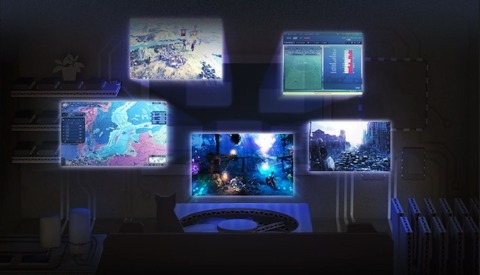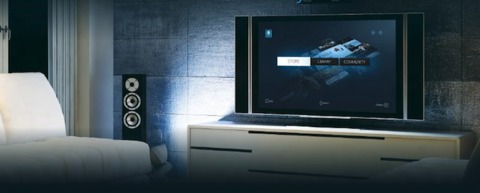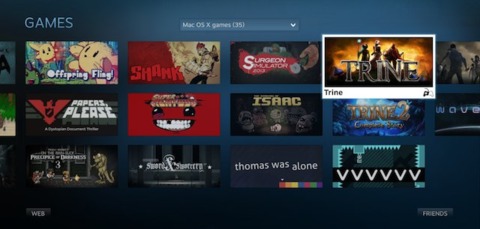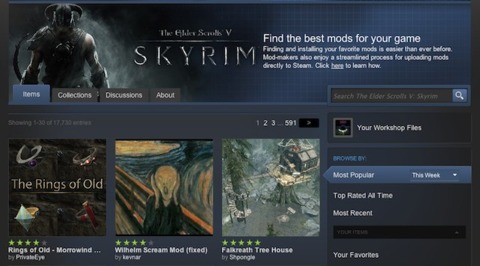What SteamOS Tells Us About the Rumored Steam Box
What does the SteamOS announcement mean for the long-rumored "Steam Box", and how will a Linux-based operating system impact consumers?
Valve kicked off its trio of announcements this week by unveiling its upcoming SteamOS, the Linux-based operating system targeted at small form factor PCs designed for the living room. The announcement comes as a bit of a surprise and leaves many questions unanswered, but an analysis of Valve's recent past and the technology behind a proposed Linux-based gaming system provides hints as to the future of Steam's presence in the living room.

Valve's current efforts started taking shape when it's simplified, controller optimized Big Picture mode UI entered beta back in September of 2012, and the proposal of a so-called "Steam Box", a console sized PC designed for gaming through Steam, made waves at the Consumer Electronics Show a few months later. With two more announcements to go this week, presumably related to the living room space, there's a chance that such a box will surface, but one question remains: will it come from Valve or third-party manufacturers?
Here's what we know so far: the SteamOS can be licensed and implemented at no cost to hardware manufacturers and users. That alone gives credence to the inevitability of third-party Steam-branded PCs. However, the Steam moniker and logo would presumably fall outside the license tied to the SteamOS, and it's likely that Valve will seek to control its brand through some semblance of quality assurance moving forward, especially so if it hopes to contend with the strength of brands such as PlayStation and Xbox.
Theoretically, working with third parties to maintain a certain level of quality for sanctioned Steam Boxes will take a considerable effort on Valve's part, but it's far more likely it will go this route as opposed to designing and manufacturing its own hardware. At least, a series of events over the past year seem to indicate as much. In the same month it released the Big Picture Mode beta, Valve began looking for new engineers to join its hardware division, specifically to "conceive, design, evaluate, and produce new types of input, output, and platform hardware." It then came to the Consumer Electronics Show with prototypes of Steam-dedicated PCs, thus reigniting rumors of an official Steam Box. Given the growth in the PC gaming space of late, the proposition of an easy-to-use, low-profile gaming PC for the living room caught on easily with an audience hungry for next-gen consoles, months before Sony and Microsoft had made any announcements of their own.

However, fast-forward to February of this year, and the hardware division was effectively disrupted when two of its key staff members were laid off: Jeri Ellsworth and Rick Johnson. Valve is a company with a lot of fluid capital geared toward experimentation, but the same willingness to initiate efforts seems applicable to shaking them up, according to Ellsworth's interview with Develop last July, though Valve later stated that the layoffs weren't an indication that any projects had been cancelled.
Chances are, given the ubiquity of Steam, there will be numerous third party Steam Boxes designed specifically for the new OS in the years to come, but there are still hurdles to overcome if Valve or manufacturers hope to find success in a dedicated gaming box. Chief among those is the Linux environment.
Unlike Windows, Linux is unable to use Microsoft's DirectX graphics API; a framework developers use when creating games. OpenGL is the most popular alternative to DirectX, and it's plenty powerful in its own right, but it's nowhere near as popular. Some games support both OpenGL and DirectX, but only a fraction of the nearly 3,000 games available through Steam. Take one look at Steam's selection of games for Mac OSX (821 games) and Linux (299 games), and the disadvantage of a Linux box becomes clear: users will have access to only a fraction of the Steam library.

On the other hand, given SteamOS's ability to stream games from a secondary Windows PC to a TV, it's likely that steam-friendly boxes will become a new niche in manufacturers' line-ups alongside desktops, laptops and tablets. In the past, managing director and Valve frontman Gabe Newell has been outspoken about device-to-device streaming technology, calling out the Miracast technology by name as a means to deliver Windows-centric Steam content to low-cost TV-connected devices. Given this, it's likely that Steam Boxes will exist in two flavors once the OS gets rolling: low-cost devices that stream games from discrete gaming PCs running Windows, and dedicated Linux gaming PCs from third-party manufacturers.
Users hoping to construct their own SteamOS PCs have another hurdle to contend with beyond the lack of DirectX: Linux driver support. The Linux community and various manufacturers have come a long way toward improving support for the untold number of PC components on the market, but Windows remains king when it comes to providing users with functional drivers. Granted, popular manufacturers such as Nvidia and AMD are keeping up just fine, but it's not unusual for incomplete drivers to plague fresh Linux adopters with exotic hardware. Sometimes the incomplete support affects components within components, such as individual chips on motherboards that can affect everything from audio output to SATA support for hard drives. It's an imperfect environment, and it's likely that users will have to compromise one way or another, by building machines from an approved list of parts, purchasing a sanctioned Steam Box from a third party, or streaming their existing PC content to a connected SteamOS device.
Plenty of people are indeed excited about the prospect of taking their PC game libraries into the living room, and chief among the benefits of doing so is support for the Steam Workshop, Steam's repository for user-created game mods. PC users have held game mods over console-players' heads for as long as the two markets have vied for dominance in the gaming space, and the Steam Box may tip the scales for consumers who are skeptical of the two upcoming next-gen consoles' ability to outpace the growth of PC gaming. Mods provide a means to customize games in exciting and new ways, and in doing so, they enable the community to drastically extend the life of a product by delivering everything from custom characters to complete single-player campaigns, all free of charge.

Of course, Valve wouldn't be able to compete with consoles unless it found a way to integrate multiplayer at a system level as well as Microsoft and Sony have, but in today's SteamOS announcement, it also mentioned the inclusion of Game Hubs, which will let players easily join game groups, form clans, and chat in-game. With that final stroke, there isn't much ground that Valve won't have covered when SteamOS goes live in the near future.
Perhaps the most exciting aspect of a Steam Box is the proposition of family sharing, a feature that will let people play games owned by other family members and, potentially, a select number of friends. Only one person at a time can use games from a distinct account, but support for account-specific game saves, in the cloud no less, makes family sharing something more than an official means to grant account permissions to numerous devices. Microsoft had a similar plan for the Xbox One, although it was retracted once the company altered its stance on DRM for its future console.
Where exactly Valve is headed is still anyone's guess, though it's likely the two remaining announcements this week, coming this Wednesday and Friday, will shed light on the future of its latest venture. It's certainly an exciting time for players, and perhaps scary for console manufacturers with hard street dates for static hardware looming overhead. If anything, Valve continues to ignite fires in the PC market, and if it has its way, the pillars of console gaming will have no choice but to react in someway to a successful Steam Box should one, or many, bring PC gaming to the living room in the near future.
Got a news tip or want to contact us directly? Email news@gamespot.com
Join the conversation